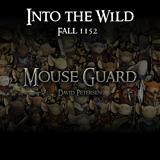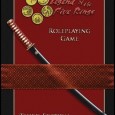 The irony of the loop between (I hope I’m getting the order correct) Jason Godesky, Willem Larson, Zach Greenvoss, Justin Evans, and me (Sean Nittner) is just crazy.
The irony of the loop between (I hope I’m getting the order correct) Jason Godesky, Willem Larson, Zach Greenvoss, Justin Evans, and me (Sean Nittner) is just crazy.
This is really the first time when I have felt like the internet created meaningful connections between people with similar interests.
To hear the beginning of this story, and a great podcast about how teach games as you play them improves the flow of the game and reduces (or eliminates) those lulls in the game where the mechanics stop serving the fiction either because a rule is forgotten or misunderstood or because players (or GMs) don’t understand how to apply the mechanics; go listen to this: The Myth Weavers – Episode 13
Also, if you follow that link, it will give you links to all the pieces that have come so far. And now I’d like to spin the wheel a little further.
As my previous post indicated I ran my Mouse Guard game, implementing the pedagogy of play components that I had been discussing with Jason and Willem online. For the most part it was a success, but I learned two important things from it:
1. Any exercise of significant length that addresses only setting elements and not the mechanics of the game, should be revised.
Case in point. When we played Mouseball, the players tossed around a plush Liam and talked about elements of a mouse’s life. This was a lot of fun, got people thinking about what dangers a mouse would face, and took less than five minutes. No mechanics were taught here as it was meant to be a gentle introduction to the game. The second exercise, however, the “Epic Journey” also fostered creative juices without introducing mechanics, but it took a good 15-20 minutes. To the players this was a frustration. They wanted to be “playing” (i.e. acting out their character and rolling dice) sooner. When we got to the accomplishment, however, they were interested again (as it involved engaging the mechanics).
2. The rules I didn’t go over during the teaching exercises are the ones stuck out like a sore thumb.
As Willem said on one of his comments in my LJ “If ever the players look overwhelmed, overly hesitant, or unsure, you know you’ve missed a step. Don’t blame them, blame your teaching plan. You probably then need to find a game that will get them over that particular hump.” In this case I realized that when I introduced traits in the “I See” game, I didn’t talk about how they relate to “checks” and that is what fouled me up in game.
So I’ll recap the chronology as best I can:
- Jason and Willem talk and Willem writes this series, “The Pedagogy of Play” (parts 1, 2, 3 & 4)
- Willem ran a game with Zach Greenvoss as a player at Gamestorm
- Zach told Justin and Sean and then we did a podcast on Episode 29 of Narrative Control
- Jason heard the postcast and told Willem about it
- Willem got in touch with me over on the Narrative Control forums and told me about his process (see part 1 above)
- Sean comments about a pedagogy for Mouse Guard
- Sean’s starts cobbling things from Willem and Justin together to create his process
- Jason creates his own process which seems more tuned toward campaign play than one shot games.
- Jason runs a few sessions both over Skype and in person. He talks about them on the Burning Wheel forums and on The Myth Weaver podcast
- Sean has now run a play test using five exercises to teach the game and warm players up to the life of a mouse, which I reported on in my other Livejournal posts.
So, wow, it’s just cool to see all of this unintentional interaction due to a couple of strange not-quite coincidences and the internet. Neat.


That makes me want to bust out into song…It’s the Circle…the Circle of Life!
During the past few games I’ve run I’ve had a similar experience of wanting to include all this cool fun stuff in the beginning of the game but feeling like we should really be ‘playing’. The thing is, we are playing! We are starting to tell the story during these learning/warm up excercises…we just haven’t hit the ‘Headliner Act’ yet.
I’ve found it useful to discuss with players before we start that these ‘Opening Acts’ are still part of the over all story and contribute to the goal of sitting around the game table and having a good time. So far no complaints…the problem is sometimes I feel like they are going too long as well. Its like there’s a certain novelty to it that wear’s off after a certain amount of time. I’m not sure what that amount of time is…I guess that’s why we playtest!
I’m still very excited about including learning/warmup excercises. Its one of those whammy (not in a George Michael way) ideas that changes how you look at running games. I’m glad this topic is still being tossed around.
Yeah, my warm ups lasted two hours, which is twice what I thought they would. Removing the Epic Journey makes me sad (I like the storyteller aspect of it) but makes sense.
Also, I want to take out the accomplishment and put in something else that will let them figure out how to uses skill/wises/traits in obstacles before I give them their characters. I stole the idea of having simplified characters from you to teach the “conflict” system. Think that instead I should just use the group challenge as an opportunity to teach the basic mechanics instead and leave out the conflict system to we see it in game?
I agree, this is really changing my outlook on teaching gaming. By giving everyone a tutorial of the game through play, we all learn together and reduce a lot of the WTF moments in game
Accomplishments & Your Points
You mentioned in the other comment that you’ve considered taking out the accomplishment. I found it worked rather nicely, personally; start with a skill roll with your Senior Artisan; then, escalate to an independent test helped by your Friend; then, show them how a versus test works in a test against their enemy. In my game, it worked very nicely to help define their friend and enemy, and teach the mechanics.
I really like your two points. Sounds like two of the first solid rules to come out of this process! Maybe rule #1 should say: “Every exercise should build both setting and mechanics.” A thread about “training wheel rules” got started on Story Games:
http://www.story-games.com/forums/comments.php?DiscussionID=9616
I posted there about the Pedagogy of Play process, and building up the complexity one bit at a time. I think what you address in your first point probably has something to do with why I don’t like “training wheel rules”: I feel like we should build on what we learned before, not toss it out. I’d rather learn one new thing and add it to what I already know, than find out that something I spent the time to learn before no longer applies.
This is pretty rad, Sean! I’m glad I found it, as I’m starting to plot out how to run entertaining Mouse Guard con games in the two hour format, which Noam was talking about at Big Bad Con 2012.
I’m pretty excited to figure this out! I’m starting by working on a con scenario of my own, one that’s loose enough to tell a lot of stories but tight enough to fit into my time constraints.